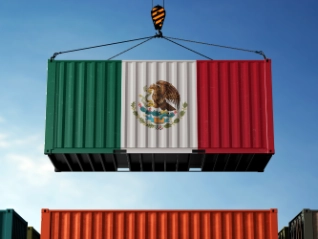
出版物
我們的行業專家報告和白皮書

新聞
最新新聞和見解

博客
最新博客

資源
指尖上的有用指南

常見問題
關於信用保險的常見問題

成功案例
卓越信用管理流程和踐的案例

客戶評價
我們各類客戶的評價
Report
Industry Trends Electronics ICT November 2024
Electronics/ICT continues to be one of the fastest growing sectors in 2024-2026.


Report
Regional Economic Outlook Emerging Asia - November 2024
The world's economic powerhouse is coping with ageing and a worsening global trade environment.

Report
Industry Trends Automotive November 2024
A rebound is on the cards, while trade frictions affect the electric vehicle segment.

Report
How are the European and US chemicals industries diverging?
The global chemical industry has reached a crossroads, with Europe facing major challenges

Report
Regional Economic Outlook Latin America - September 2025
Latin America's economic growth is structurally low. Fostering investment could help reverse this.

Report
US elections October 2024
Which direction will the US trade winds blow?

Report
Machines and Engineering Industry Trends June 2024
Contractions continue in Europe and the US, but a 2025 rebound is on the cards
載入更多
檢視 7 自 146
News
Will 2025 be the year of tariffs and trade wars?
Atradius Chief Economist John Lorié looks ahead to a year that feels almost impossible to predict, as the global economy braces for Trump and turbulence.


News
Is the euro set to slide?
The short-term outlook for the euro is uncertain. Three main risk factors are likely to determine the euro’s direction of travel in the coming weeks and months.

News
China’s economic troubles ripple worldwide
The Chinese economy has sneezed…so, will the world catch a cold? Countries with deep trade links to the world’s second largest economy are bracing for impact.

News
Asia expects insolvency rise as China’s economy slows
A rising level of insolvency risk has emerged as a major concern looking ahead for half of the companies surveyed across Asia for the 2024 edition of the Atradius Payment Practices Barometer.

News
What the Fed's "Jumbo" rate cut means for the global economy
The Federal Reserve's interest rate cut could have a significant impact on global economic growth, influencing businesses and markets worldwide.

News
The promise and potential pitfalls of AI in international trade
AI is being heralded as a game-changer for international trade, but it poses challenges as well as opportunities

News
Atradius and Mondu team up
Atradius and Mondu team up to enable better payment solutions for B2B e-commerce
載入更多
檢視 7 自 28
Resource
Letters of credit
Letters of credit are bank guarantees to pay a seller (usually an exporter) for goods or services that the seller has shipped to a buyer (usually an importer).


Resource
Early detection of default risks
Insolvencies often happen when an important business partner folds. Particularly small and medium-sized enterprises with capital ratios of less than 20% can fall victim to this domino effect.

Resource
How to do a risk assessment of your accounts receivable
Your company's accounts receivable is an important indicator for assessing business health.

Resource
Dealing with late payment excuses
Unfortunately some businesses make up excuses to explain away delays in settling invoices. Here are some examples of the more common excuses and tips on how to best deal with them.

Resource
Ten tips to get your customers to pay on time
The secret to prompt payment lays in a systematic and consistent approach to credit management.

Resource
The cultural advantage
Read about the importance of culture within international business and the possible dangers if it is not considered.

Resource
Improving cooperation between credit managers and sales
One customer, diverging interests? Managing credit successfully in a sales-driven environment.
載入更多
檢視 7 自 12
有關信用保險的常見問題,助您了解其運作方法及為公司帶來的優勢。
Case Study
Park Polymers: Credit Insurance for Risk Management and Growth


Case Study
EnCom Polymers: credit management for chemicals sector
With the backing of Atradius’s resources, EnCom Polymers has been able to expand business with existing customers and go after new business they previously would have shied away from.

Case Study
BVV GmbH: credit management for steel processing
BVV GmbH grew internationally and recognised risks such as companies on the brink of insolvency in plenty of time to mitigate the risks.

Case Study
Vinci Construction: credit management for the construction sector
Atradius Surety has enabled Vinci Construction France to expand their sources of finance beyond their banking partners. This partnership with Atradius benefits Vinci Construction by providing substantial flexibility, excellent responsiveness and a capacity for innovation.

Case Study
Continental Banden: credit management for the automotive parts sector
How we are part of Continental Banden Groep B.V.'s business process, minimising risk and supporting sales

Case Study
Metalco Inc.: Driving new business with quick communication
Ben Green, President and Owner at Metalco Incorporated in Chicago, Illinois, explains how Atradius Trade Credit Insurance has helped him secure new business confidently.

Case Study
L'Oreal: credit management for the beauty sector
As a successful business, L’Oréal Hong Kong wanted a partner that could help protect their regional interests and support their focus on further growth.
Testimonial
Omron - electric machinery sector
Omron has achieved sustainable growth while navigating the uncertainties of China-US trade relations and regional manufacturing transformation.


Testimonial
Ferm - machines sector
FERM (International) offers competitive payment terms and limits their credit risk to developing countries by using Atradius Dutch State Business (DSB) and the DGGF.

Testimonial
El Ganso - retail fashion sector
El Ganso credits our support in helping the fashion brand grow from a domestic-focused Spanish startup to a successful international business.

Testimonial
KMOdynamoo - marketing sector
Late payers prompted content marketing agency KMOdynamoo to take out an Atradius credit insurance policy and has resulted in better debtor management.

Testimonial
Calidad Pascual - beverages sector
Calidad Pascual partners with international credit insurance firm Crédito y Caución Atradius to gain additional knowledge of international markets.

Testimonial
Janson Bridging - infrastructure sector
Janson Bridging (International) uses export credit insurance from Atradius Dutch State Business (DSB) to offer favourable credit terms to customers located in emerging markets.

Testimonial
Brook Green Supply - energy supply sector
By providing open dialogue, insight and valuable credit information we helped Brook Green Supply improve their internal credit risk management systems.
載入更多
檢視 7 自 9
Case study
Metalco Inc.: Driving new business with quick communication
Ben Green, President and Owner at Metalco Incorporated in Chicago, Illinois, explains how Atradius Trade Credit Insurance has helped him secure new business confidently.
探索
工具
提升戰略增長洞察




































